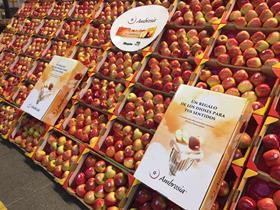
Spanish consumers are eating more imported produce according to the latest data published by Fepex.
Fresh fruits and vegetable imports grew by 8 per cent in volume and 9 per cent in value last year, reaching 3.3m tonnes and €2.757bn. Avocados, kiwifruit and apples were the three most imported fruits, while in vegetables, potatoes and green beans led the field.
The customs data also shows that Spanish fruit and vegetable exports remained broadly stable in 2018, maintaining the trend seen over the past three years. Shipments registered an increase of 1 per cent in value while volumes fell by 1 per cent, totalling €12.832bn and 12.5m tonnes respectively.
Exports of vegetables grew 4.4 per cent in volume and 0.4 per cent in value to 5.3m tonnes and €5.290bn. Within the category, peppers, cucumbers and lettuce posted the biggest increases, while tomatoes saw a 7.5 per cent decline in value to €927m on a stable volume of 812,571 tonnes.
Pepper exports stood at 745,903 tonnes (+ 8.6 per cent) and €977.2m (+ 2 per cent); cucumber exports totalled 648,521 tonnes (+ 3.4 per cent) and €595m (+ 5 per cent) and lettuce rose to 795,195 tonnes (+ 4.3 per cent) and €690m (+ 4 per cent).
Overall fruit exports fell 4.4 per cent in volume to 7.1m tonnes, while the value increased by 1.4 per cent to €7.542bn. Watermelons, table grapes, raspberries and blueberries were among the best performers.
Watermelon shipments were up 17 per cent in volume and 32 per cent in value, totalling 861,952 tonnes and €428.6m. Table grapes grew 19 per cent in volume and 18 per cent in value to end the year at 170,658 tonnes and €337m.
Raspberries and blueberries also performed well. Raspberry exports rose by 10 per cent in volume to 50,414 tonnes and 11 per cent in value to €383m, while blueberry volumes and values increased by 24 per cent and 18 per cent to 57,802 tonnes and €324m.
Nectarines saw the biggest drop in volume, falling 24 per cent to 357,471 tonnes with a corresponding value of €408m (-2.4 per cent).
Peaches and plums also saw significant volume decreases, down 16 per cent and 27 per cent respectively to 382,378 tonnes and 71,565 tonnes, while persimmon shipments fell by 22 per cent in volume and 10 per cent in value to 168,341 tonnes and €173m.
Spain’s exports to its main European markets finished the year strongly, with the value of shipments to Germany rising by 3 per cent and France and the UK seeing increases of 5 per cent and 3 per cent respectively.
However, exports to non-EU markets fell by 10 per cent to €534m, reflecting the barriers in accessing a number of markets, Fepex said.
The exception was Canada, which saw a 36 per cent rise in exports to €93.4m thanks to its free trade agreement with the EU coming into force.






No comments yet